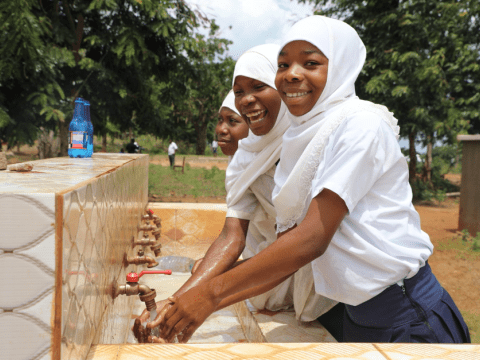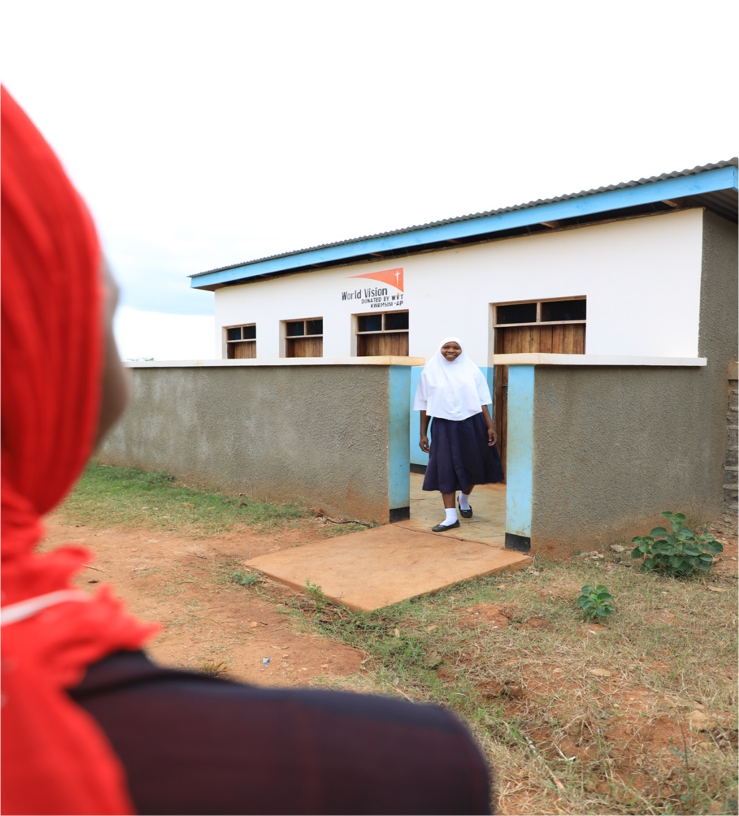New sanitation and hygiene facilities restore hope among students in Tanga

By Alpha Nsemwa - Senior Communications and Public Engagement Officer
In developing countries, scarcity of toilets in schools is a threat to education to millions of children. The impact is particularly higher for the girl child. Most of the time, because of the lack of separate toilets for girls and boys, when she reaches puberty, access to a separate toilet can be the decisive factor for whether she continues with her education or not. Many of the girls who quit school due to poor sanitation facilities have ended up in early marriage or early pregnancies, which have diminished their hope for a better future.
As part of its Vision 2025, the Government of Tanzania has pledged to increase access to improved sanitation to 95 percent by 2025. The Second Five-Year Development Plan (FYDP II) has also set the target for access to improved sanitation facilities at 85 percent in rural areas. In support of the Government’s efforts, World vision has been helping to improve adequate sanitation and WASH (water, sanitation and hygiene) facilities, in homes, schools and health centres to avoid these areas becoming breeding grounds for diseases that kill children and threaten their ability to grow.
Steven Nziku, Headteacher at KwediKabu Primary School in Tanga Region, says that, “When there is lack of proper sanitation and WASH facilities in schools, such as a toilet which separates boys and girls, it deteriorates students’ spirit to study. Many of them will find it difficult to come to school, and will leave in the middle of a class to go home just to use the toilet. It consumes their time and when they give up studying, it is easy to get swayed by peer pressure. We have heard stories of our students who quit school due to these circumstances and ended up getting married at a young age.”
The headteacher adds that before World Vision built toilets and hand-washing facilities at their school, health challenges were common, with cases including cholera which affected their performance. Many children were forced to stay home to avoid contracting the disease.
“We had a single toilet for 14 teachers, which was shared by both male and female teachers. There were only six latrines, which were shared by more than 1,000 students and whose doors were mostly broken. This was a major setback for our school and for community members; it was easy to contract cholera”, narrates Nziku.
In 2020, World Vision handed over hand-washing facilities and new toilet buildings to the school. “Since we received help from World Vision, many things have changed. I remember in 2020, we enrolled 105 students but this year we managed to enroll 132 students. This is a major achievement we do not have school dropouts.” He further adds that the hand-washing facilities installed at the school have been helpful during the ongoing global COVID-19 pandemic.
“Apart from keeping children in school, we have used these facilities to mitigate COVID-19”, Nziku continues. “We have used them to clean our hands and the school hygiene has really improved. The toilets are not only constructed as separate, but they also have a special place for girls during their menstruation period, which they use to change their towels instead of being forced to go home and come back”.

One of the female teachers, 29-year-old Husna Yambazi, recalls the days when the school had no toilets sufficient enough to facilitate all students. “There was a big challenge, mostly to female students”, she says. “During their menstruation period, we couldn’t help them; they had to go home. With menstrual cramps the risk was high that they would not return. There was also an eruption of diseases every now and then, so some students quit, got married at a young age and some even pregnant. We have had cases which have had a life-changing impact on many children’s lives.”
Yambazi further adds that when World Vision approached them for the first time and showed an interest in helping them, many community members joined in the project to build the toilets and hand-washing facilities. “World Vision built us toilets; the local authorities mobilised community members, and together we all participated in assisting with some labour where needed. After the project was completed, we have increased our enrollment and to be honest our students are no longer exposed to health risks”, she says.
One of the parents, 25-year-old Amiri Hija, says that in having proper school infrastructures, such as new toilets and hand-washing facilities, it is easier to ensure children’s proper growth and ensure their steady future. “I am a father of a ten-year-old girl, and I expect her to start her menstruation soon. To see a school which is equipped such as this one, I have no worries that my daughter is in a safe environment. Having good toilets and proper hand-washing facilities is truly ensuring our children can develop in a comfortable environment. I thank World Vision for supporting us with these facilities; they have also been helpful during the COVID–19 pandemic. Our children have been kept safe”, he says.
The impacts of long-distance walking in search for a toilet, or having to hide in a bush or a forest was ‘torture and embarrassing’ to the students. “I am usually the first in class but it was a struggle to maintain the position since most of the time I spent running home to find a toilet and then get back to school”, says Standard Seven student Wahida. “I used 30 minutes from home to school; it is almost the total time it takes to cover single subject. This was a major setback for me,”
The relieved 15-year-old adds that she and her schoolmates have been ‘given hope again. “World Vision has constructed for us enough hand-washing facilities, which we use to wash our hands especially during the COVID-19 pandemic, and they have built toilets with eight holes separately for boys and girls, with a special designed area for us when we are on our menstruation period.”
For Abdul who is in Standard Seven, “I am grateful to World Vision for building toilets in our school; a lot of progress has been made. Our sisters come to school daily, we have been washing our hands all the time to avoid COVID-19, and we haven’t had cholera for a long time! We will keep it that way by cleaning our school environment!”
Not many people would immediately think about toilets when it comes to things which hinder progress for children’s growth. However, experience has shown that the availability of toilets can not only help children avoid the risk of getting sick due to poor hygiene and subsequently missing school, but also encourage children, especially girls, to stay in school and chase their dreams.